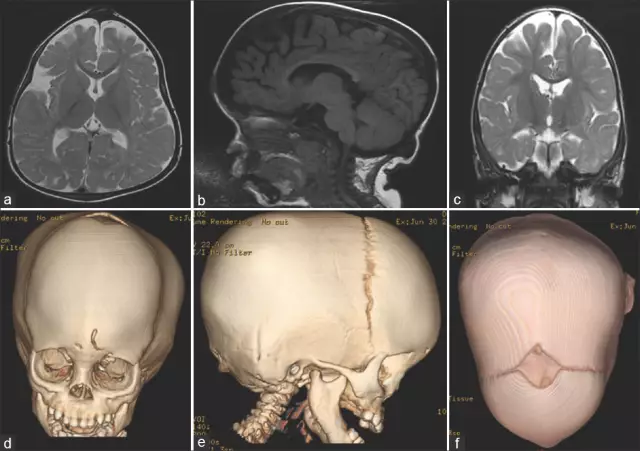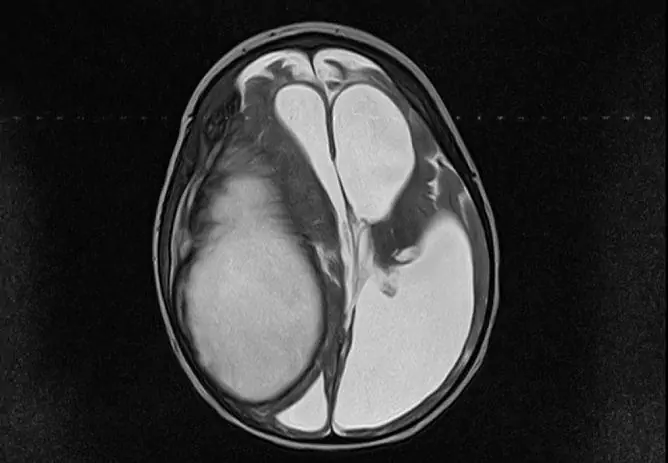- Author Rachel Wainwright wainwright@abchealthonline.com.
- Public 2023-12-15 07:39.
- Last modified 2025-11-02 20:14.
Mucopolysaccharidosis

Mucopolysaccharidoses represent a large group of monogenic hereditary diseases resulting from disturbances in the lysosomes of the multistep process of enzymatic catalysis of glycosaminoglycans (GAGs).
Glycosaminoglycans are complex heterosaccharides that consist of polysaccharide chains composed of sulfated hexosamine and glucuronic acid residues. Dermatan sulfate, keratan sulfate, heparan sulfate, chondroitin-6- and chondroitin-4-sulfate are glycosaminoglycans.
For the first time, the disease mucopolysaccharidosis was described in 1917 by Gurler. Currently, about 10 genetic types of mucopolysaccharidosis are known, five of which arise as a result of a violation of the activity of sulfatases, four - of glycosidases, and one type develops with a lack of transferase. With mucopolysaccharidosis, particles accumulate in the body, which leads to the appearance of various symptoms and pathologies in a person.
The disease is inherited in an autosomal recessive manner.
What happens with mucopolysaccharidosis?
In the presence of the disease, the system of lysosomal enzymes is damaged, which are involved in the catabolism of glycosaminoglycans. As a result of a deficiency of enzymes in organs and tissues, glycosaminoglycans accumulate, which makes it possible to classify mucopolysaccharidosis as a storage disease.
The accumulation of glycosaminoglycans leads to disruption of the functional state of various systems and organs, and due to the fact that glycosaminoglycans are part of the connective tissue, one of the main symptoms of mucopolysaccharidosis is systemic damage to the skeleton and a delay in physical development. This is especially pronounced with I, IV, VI types of mucopolysaccharidosis.
Symptoms of mucopolysaccharidosis
Symptoms of mucopolysaccharidosis include growth retardation, which begins towards the end of the child's first year. Rough facial features should be noted: large tongue, overhanging forehead, deformation of the teeth and ears, hypertelorism. The chest is deformed, kyphosis of the lumbar and thoracic spine is pronounced. Characterized by hepatosplenomegaly, inguinal and umbilical hernias, limitation of joint mobility.
X-ray examination shows "fish" vertebrae, early ossification of the occipital-parietal suture. At the same time, the formation of ossification nuclei is not disturbed.

The neurological symptoms of mucopolysaccharidosis include general motor retardation, diffuse muscle hypotension. For different types of mucopolysaccharidosis, hearing loss and a decrease in intelligence are also characteristic.
Types of mucopolysaccharidosis
According to the severity of psychological symptoms and bone changes, as well as the rate of progression of metabolic disorders, 7 types of mucopolysaccharidosis are known:
- Type I, also called Hurler's syndrome. The disease is characterized by rapid development. A high content of chondroitin sulfate B and heparitin sulfate is found in the urine of patients. It is inherited in an autoimmune recessive manner.
- Type II, or Gunther's syndrome. With this disease, retinitis pigmentosa, hearing loss is noted. The disease progresses slowly. In urine, there is also an increased content of heparitin sulfate and chondroitin sulfate B, but in smaller amounts. It is inherited in a recessive manner, depending on gender.
- Type III, Sanfilippo syndrome. This type is characterized by severe dementia and a large amount of heparitin sulfate in the urine. Inheritance is autoimmune recessive.
- Type IV, or Morquio's syndrome, with significant deformation of the skeleton, especially the chest. Unlike other types, it is characterized by the absence of corneal opacity, decreased intelligence and the appearance of rough facial features.
- Type V, Sheye's syndrome. It is characterized by corneal opacity and moderate skeletal deformity. It is inherited in an autoimmune recessive manner.
- VI type, or Maroto-Lamy syndrome. Growth retardation, barrel chest, rough facial features are characteristic.
- Type VII, resulting from a lack of beta-glucuronidase.
Diagnosis of mucopolysaccharidosis
Diagnosis of the disease is based on genealogical, clinical and biochemical studies.
Mucopolysaccharidosis treatment
The disease predominantly has symptomatic treatment. The patient is prescribed hormonal drugs: prednisolone, thyroidin, ACTH to suppress the production of mucopolysaccharides. In the treatment of mucopolysaccharidosis, the patient is prescribed large dosages of vitamin A and drugs to normalize cardiac activity. If necessary, cytostatic agents can be prescribed.
Prevention of mucopolysaccharidosis
There is no specific prevention of the disease. It is necessary to conduct prenatal diagnostics to detect a lack of enzymes in amniotic cells.
YouTube video related to the article:
The information is generalized and provided for informational purposes only. At the first sign of illness, see your doctor. Self-medication is hazardous to health!






